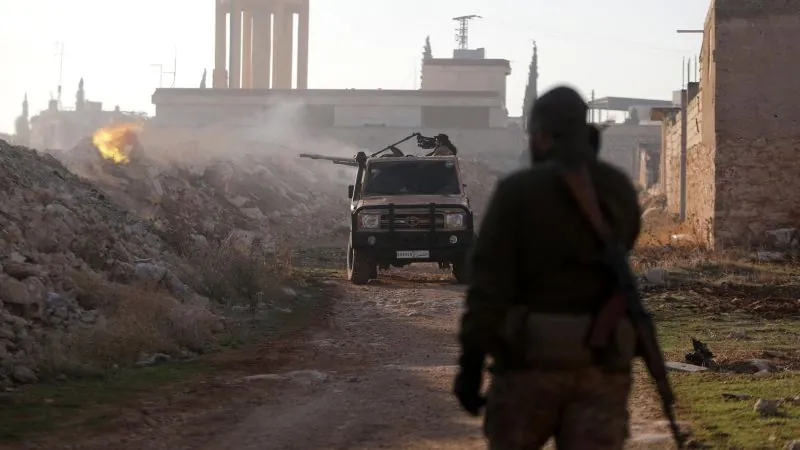
The Rise of Syrian Rebels: Aleppo's Stunning Turnaround
2024-12-03
Author: Chun
In an astounding turn of events, the Syrian civil war has witnessed a dramatic shift with Syrian rebels regaining control over Aleppo, a pivotal city that has been a battleground since the conflict's inception. Just last week, a coalition of rebel forces, operating under the aegis of Deterrence of Aggression, executed a surprise offensive that sent shockwaves through President Bashar Al-Assad's regime, reversing fortunes and reigniting the embers of a conflict that had simmered down in recent months.
The coalition leading this charge is composed of significant armed groups, predominantly Islamist factions that, despite their historical rivalries, have unified to combat the shared threats posed by Assad's regime, the remnants of ISIS, and Iranian-backed militias.
Hayat Tahrir Al-Sham: The Powerhouse of the Coalition
At the forefront of this rebel coalition is Hayat Tahrir Al-Sham (HTS), an organization renowned for its military prowess. Founded by former al-Qaeda operative Abu Mohammad al-Jolani, HTS has evolved over the years, firstly emerging from the ranks of Jabhat al-Nusra, al-Qaeda’s Syrian affiliate. Following a public split from al-Qaeda in 2016, HTS was established as a more independent entity, even as the U.S. and Western nations designated it a Foreign Terrorist Organization in 2018, with a bounty placed on Jolani's head.
In recent years, HTS consolidated its power in Idlib province after the sobering loss of Aleppo in 2016. During this period, the group adeptly controlled various economic sectors, strengthening its grip on power in northwestern Syria. Experts suggest that HTS played a crucial role in the recent successful offensive on Aleppo, marking a significant moment in its resurgence.
The Syrian National Army: A Turkish Proxy
Another formidable player in the coalition is the Syrian National Army (SNA), a diverse umbrella organization composed of numerous factions. Primarily funded and armed by Turkey, the SNA has been perceived as a proxy force for Turkish interests in Syria. Among its ranks is the National Liberation Front, which includes factions like Ahrar al-Sham, known for its aspirations to oust the Assad regime and establish an Islamic state based on Sharia law.
Following the recapture of Aleppo, SNA’s deputy commander Ahmed al-Dalati addressed community leaders, urging them to safeguard all ethnic and religious minorities in the city. “Our orders are clear: no one shall be harmed, whether they are Muslims, Christians, or Armenians. We must protect everyone,” he stated emphatically.
The Complex Dynamics: Turkey and Kurdish Forces
The shifting alliances have ensnared the SNA in a web of complexities, particularly in its relationship with the Kurdish population. Turkey, which views the Kurdish Workers’ Party (PKK) as a terrorist organization, has launched multiple military operations against Kurdish forces, diverting attention from confronting the Assad regime.
As analysts note, the Syrian rebel factions' reliance on Turkey has complicated their original objectives. They have increasingly targeted Kurdish areas instead of focusing solely on defeating Assad. This strategic shift raises questions about the true motivations behind the coalition’s actions and whether its fight is for the Syrian populace or for Turkish ambitions.
The Future Unfolds
With Aleppo back in the hands of the rebels, implications for the broader conflict in Syria remain profound. The unexpected unity among these groups reflects a desperate but potent alliance with the potential to reshape the landscape of the ongoing civil war. As the situation evolves, the world watches closely, wondering if this marks the resurgence of a robust opposition or the continuation of a bleak cycle of conflict.
The saga of Aleppo serves as a stark reminder: in the chaos of war, the dynamics can shift in an instant, and today's allies may be tomorrow's adversaries. Keep an eye on the unfolding events—this conflict is far from over!


 Brasil (PT)
Brasil (PT)
 Canada (EN)
Canada (EN)
 Chile (ES)
Chile (ES)
 España (ES)
España (ES)
 France (FR)
France (FR)
 Hong Kong (EN)
Hong Kong (EN)
 Italia (IT)
Italia (IT)
 日本 (JA)
日本 (JA)
 Magyarország (HU)
Magyarország (HU)
 Norge (NO)
Norge (NO)
 Polska (PL)
Polska (PL)
 Schweiz (DE)
Schweiz (DE)
 Singapore (EN)
Singapore (EN)
 Sverige (SV)
Sverige (SV)
 Suomi (FI)
Suomi (FI)
 Türkiye (TR)
Türkiye (TR)